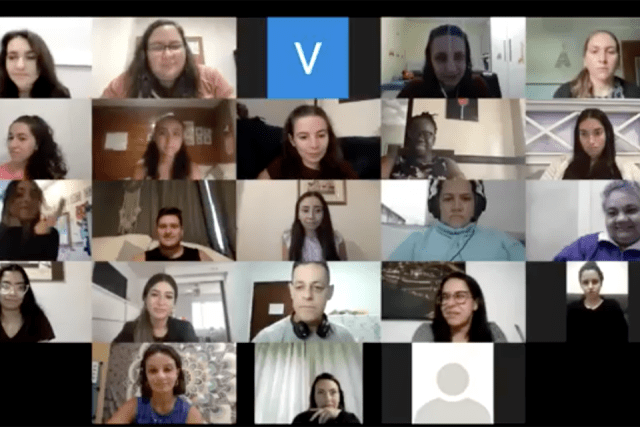By Maria P. Mello, Ph.D., BCBA
Assistant Professor, Education Specialties, The School of Education

I brought to life the Global Online Learning Exchange (GOLE) project in my graduate class in Applied Behavior Analysis in the Fall 2021 semester after anxiously waiting for a year due to the pandemic.
My partner was Siglia Camargo, Ph.D., Associate Professor in Special Education and Inclusive Education at the Universidade Federal de Pelotas (UFPel) in Southeast Brazil. In addition to Dr. Camargo and her students, we partnered with community special education teachers in both New York City and Northeast Brazil.
We had three main objectives for our graduate students’ GOLE project: engage in culturally responsive practices in applied behavior analysis and special education, apply content knowledge and skills to the project, and engage in cultural humility during collaboration. The main objective of our GOLE project was for graduate students from St. John’s and UFPel to engage in culturally responsive practices in special education and applied behavior analysis while working together with a community teacher to help address the support needs of students with disabilities in their classrooms.
Together the graduate students developed a classroom behavior support plan for a student with a disability who was identified by the classroom teacher and the student’s parents. It was developed considering the cultural needs of each student, classroom, school, and country.
The secondary goal of our GOLE project was for our graduate students to put into practice the skills and methods they were learning in the graduate class. The students collaborated in four separate groups that were supervised by myself and Dr. Camargo. We aligned our syllabi to teach the same content, materials, and text so our students would be able to apply the same skills, content, and methods to their project. The graduate students and community teachers also brought their own experiences and knowledge, which were valued in the learning exchange.
In addition to the idea of cultural responsivity, we wanted to teach our students to engage in cultural humility when collaborating with others from different cultures and countries. Cultural humility in applied behavior analysis is engaging in mutually beneficial relationships where no one is the expert and everyone is on the same level; there is no hierarchy (Wright, 2019). In addition, self-reflection is critical to engaging in cultural humility.
Throughout the semester we had several meetings with the graduate students and the community teachers to develop the plan, understand the differences in special education processes and school systems in both countries, and understand how to best support the teacher and student with a disability. In this way, the graduate students had to continuously reflect on their role and their actions in the groups in which they were participating and collaborating.
This virtual learning exchange was critical not only to develop culturally-responsive practices in our students, but also to provide opportunities for our graduate students to engage on a global scale and learn new global perspectives.
Reference
Wright P. I. (2019). Cultural Humility in the Practice of Applied Behavior Analysis. Behavior analysis in practice, 12(4), 805–809. https://doi.org/10.1007/s40617-019-00343-8
Related News
Entangled Across Borders: Celebrating 100 Years of Quantum Physics Through a Global Classroom
In Spring 2025, I implemented the first iteration of the Global Online Learning Exchange (GOLE) in my Scientific Inquiry class at St. John’s University, a core class focused on how scientists make...
Grazie, Papa Francesco: Notes on the Passing of Pope Francis
Loreal is a junior at St. John’s University majoring in International Management with a minor in Social Justice : Theory and Practice in the Vincentian Tradition . She is also the President of the...
Snapshots: New Students from Around the World
The St. John’s community specializes in being a welcoming, friendly, accepting place and so we are excited to introduce you to some of our new international students. We hope these students will...
